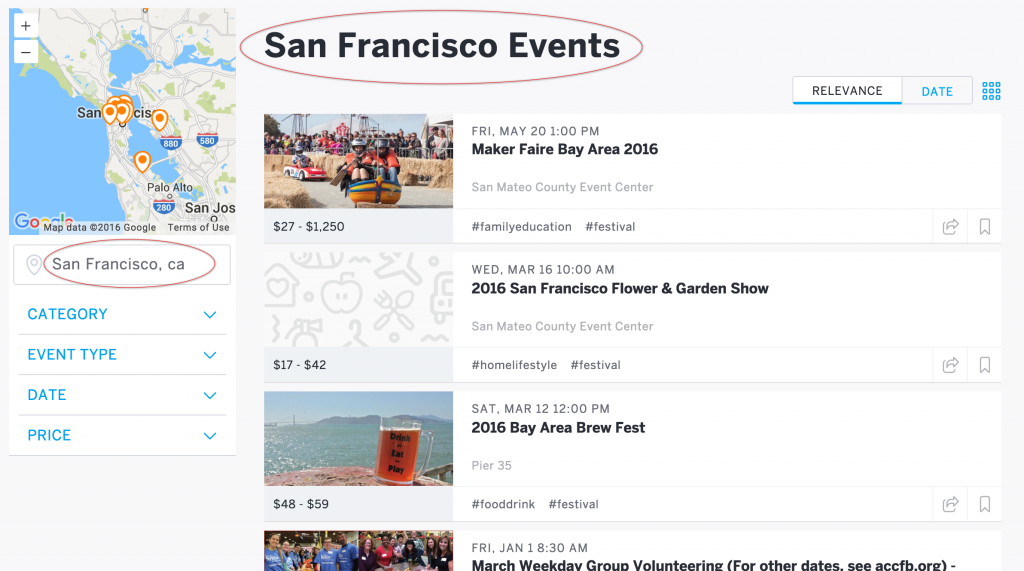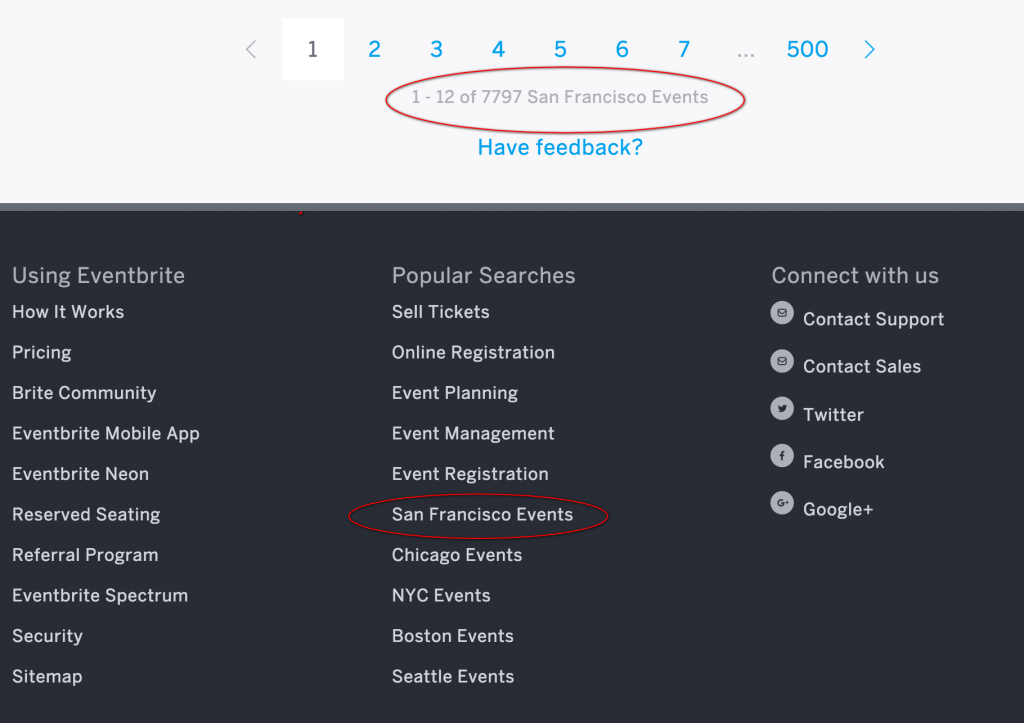Search Engine Optimization is important for all sites, but at Eventbrite it’s critical to our business. Many of our pages are created by our organizers, and our ability to surface the events to relevant people is one of the ways we make sure our customers are successful. My name is Beck Cronin-Dixon and I am one of the Software Engineers at Eventbrite focusing on making sure our organizers’ events rank highly in Google and their customers are able to find the events they are looking for.
Before starting at Eventbrite, I was (of course) aware of the term SEO but didn’t fully understand its meaning or role in a company, especially in terms of programming. Through thorough digging I realized it is essential for any website that wants to have its service or products in front of customers to invest in the right SEO tactics. In this post, I wanted to cover the very basics of SEO that we incorporate into the Eventbrite site and has helped us grow organic traffic year to year.
When Search Engine Optimization is mentioned I usually receive two kinds of reactions: the first is confusion, and the second is hesitancy. While most people know that SEO is the practice of improving a website’s ranking within search engines they, it’s not often clear on how it can and should be done.
The days of ‘build it and they will come’ are now over. Websites have to not only think about the quality of their content for users, but also how it will be perceived by search engines. High quality content that attracts a lot of eyes will always win for both. Google heavily weighs in the favor of sites with high authority and relevancy. This is often hard for sites that rely heavily on user generated content. Here at Eventbrite, we are always trying to improve the rankings of our organizers’ events and other Eventbrite pages. We often have to be on the lookout for user generated content that could be deemed duplicate or low content by Google. Too many of these pages could result in a low authority score, or worse, a penalty that can affect the whole site.
Google’s Guiding Principles
Authority, relevance, and trust are the three principles that Google centers their search algorithm around. While the content of the page largely determines where a site will fall within these principles, sites that optimize for Google within their code reap the benefits.
Trust and Authority
Trust and authority are associated with websites that accumulate a high number of links from other trusted websites. Sites that receive the majority of their inbound links from less “trustful” sources will either receive a low pagerank or be penalized. Pagerank is Google’s measurement of quality and trustworthiness for a page. Google acknowledges that sites do not have control over which domains are linking to their page. A balance of inbound links from both low and high authority sites is often expected. Google is mainly concerned with how quickly those links appear and whether they are all received from low authority domains. These are signs of manipulative or black hat SEO tactics.
![]()
The link above is from a TechCrunch article that links to the Eventbrite homepage. As TechCrunch is considered high authoritative source by Google, Eventbrite’s page rank is positively affected from this outbound link.
Similarly, linking to less trustful sources can also impact your page rank. By linking to another page you are passing on your authority and trust to them. This leads to them receiving a higher ranking. However if you have linked to a page with a low score your authority is reduced. As many of Eventbrite’s pages include content that is out of our control we enforce that all links added by users through our wysiwyg editor include the nofollow property.
![]()
This attribute that is included on anchor tags will instruct Google to ignore this link when parsing your content for evaluating a pagerank score. The page that the link leads to will not affect your ranking. To sum up you are removing your vote for this link.
Another way we protect our authority ranking at Eventbrite is to make sure Google does not index any pages we deem as low quality. Low quality pages can include those that have short content, is of low quality or we would not want the content or its inbound links to be associated with Eventbrite. Our trust and safety team do a great job targeting those user generated pages that fit into this category. When an event is created we immediately add the following meta tag.

This tag instructs google to disregard this page and not follow any links it contains. The page will not be considered for search results and none of its inbound links will affect Eventbrite’s overall SEO score. Once the event has passed our trust and safety algorithm this tag is removed and it is now eligible to be indexed by Google.
Relevancy
Google is now smart enough to determine whether a page is relevant to a search term without relying solely on the meta description and keywords. These now carry a lot less weight when ranking pages and keyword spamming can lead to a penalty. In the past it was possible for pages that were unrelated to a popular search term to appear highly in search results due to the overuse of keywords. This led to a terrible user experience and Google quickly learnt how to weed out these black hat seo tactics.
Using search keywords on your page is still important to gain the attention of Google however they should fit into the flow of the content and appear naturally. For our san francisco directory page to appear highly in Google for the search term ‘San Francisco Events’ we included these keywords in a number of places on the page. Each use of the keyword enhances the user experience rather than dettracts from it.


We have included the keywords above the fold twice and within a h1 tag. We also included the keywords within the pagination and footer. Each time ‘San Francisco Events’ has been used it positively impacts the user’s experience which is closely related to SEO. Any enhances made for SEO should also enhance the user’s experience.
Our directory page also includes the keywords in its url.
http://eventbrite.com/d/ca--san-francisco/events/
This url is easy to read and communicates to the user what the page is about. Google is also on the lookout for pages exploiting their url with keyword spamming. The following are urls that Google would penalized for this practice.
http://account.free.online.savings.samedaypaydayloansusa.com www.emailloginsigninup.com http://loan.payday.paydayloanspaydayloansusa.com
User experience and SEO should go hand-in-hand. Google’s main value proposition is to return search results that are the most relevant for its users based on their query. Therefore it aims to rank pages based on how valuable it would be to the user. You should always consider the end user and how SEO changes will affect them. If it would deter users from using your site chances are high that Google will also see the changes in a negative light. At Eventbrite, we are constantly adding new features that adhere to Google’s principles while enhancing the site’s user experience.
Both tools are useful if used properly. Adwords is a great tool with branding and new products. SEO is more like a long term strategy. To test conversions, adwords is very useful and comes in handy while seo targets are not yet reached. It is costly but you get what you pay for. I agree too that seo – if it works could be the winner in the long run.
This is very good information about SEO, I also finding some <a href="http://www.hammerandhelmet.com"Reputed SEO San Francisco Company for my website.
Thanks for shearing this blog.
Most of us are really aware that trust & authority is important for our long-term SEO project. However, it can be very difficult for a new established site. Do you have a shortcut?
Hi Jas – this may be a boring response but there really are no shortcuts when it comes to SEO. Delivering quality content that attracts eyes to your page is and always will be the best method to building domain authority. Not only will your popularity/relevancy rankings improve through click through rates other sites will link to your content which will improve your site’s trust score and help boost the rest of your site. Black hat SEO tactics may give a website a boost for a short period of time but they always end up hurting a site’s domain authority and page rankings.
Yeah, definitely zero shortcuts. It’s hard work + expertise + building up your online ‘house’. Just like we’d have to build up a house in the real world, from scratch.
Speaking of creating social profiles for links, if your goal is to dominate Google, then you should make sure you join Google+. Google’s own social network can help you rank better in search results for people you are connected with. For example, when I’m logged in to Google+ and I search for SEO, I get the following in my top five search results. Personalized search results based on who I am friends with are marked by the little person icon.
This is great to know and we will let our clients know about the SEO friendly structure when using Eventbright to promote their events.
Thanks for Search Engine Optimization article. I can not think better article than this one exist on internet. Keep writing author.